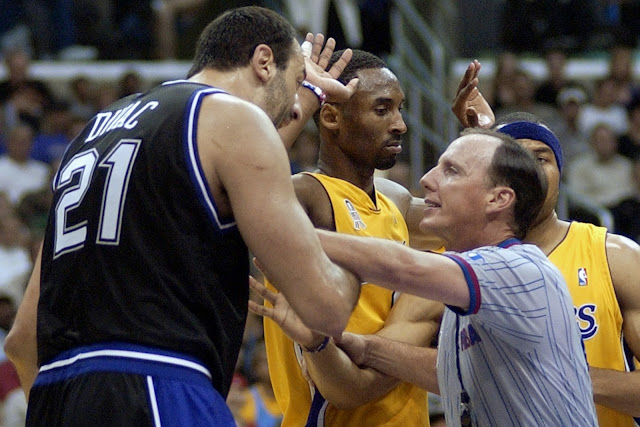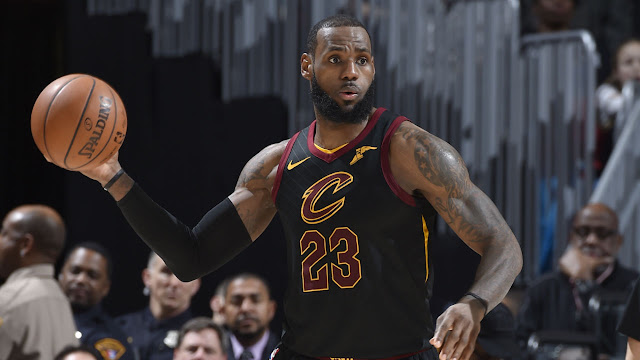History of NBA Conspiracy theories - 2002 Western Conference finals LA Lakers vs Sacramento Kings Game 6
Did the NBA really fixed Lakers-Kings Series back in 2002?
The most notorious series of recent history is the 2002 Western Conference finals, when the two-time defending champion Los Angeles Lakers staved off elimination by defeating the Sacramento Kings. Tim Donaghy alleged that two referees (understood to be Dick Bavetta and Bob Delaney) fixed the series in particular game 6.
Donaghy was convicted of betting on games as his tenure as a referee in the NBA so he may not seem a reliable source, but many considered him an insider with very reliable information. And he wasn’t the only one who found something amiss in Game 6. Announcer Bill Walton (throughout the game), prominent sportswriters, ripped the referees for poor calls favoring the Lakers. Many critics noted that the Lakers shot 27 free throws in the fourth quarter, and the Kings only nine.
An NBA game could, of course, be fixed. That’s why the NBA maintains an extensive security department. Its concern is largely about addicted, vengeful or mentally ill players, referees, and even owners, perhaps in association with gamblers. History includes several examples of rogues rigging sporting events.
An NBA game could, of course, be fixed. That’s why the NBA maintains an extensive security department. Its concern is largely about addicted, vengeful or mentally ill players, referees, and even owners, perhaps in association with gamblers. History includes several examples of rogues rigging sporting events.
But Donaghy’s allegations seem true. He claimed that the NBA hierarchy instigated the fix in 2002 - that the referees received an approved message to manipulate Game 6 in the perceived best interests of the league.
Game 6 in 2002 remains the most likely possibility of a game in which the NBA participated in a fix. Was Game 6 fixed?
The motive, of course, was money for the owners. This would from ensuring a seventh game, and even more so if the Lakers reached the Finals and boosted television ratings. The real payoff would come if nationally prominent teams routinely reached the Finals, translating into more lucrative television contracts.
Bavetta has attracted much attention, but the referees made questionable calls. The most important part of Donaghy’s story involved the purported instigators, the unnamed high-level NBA representatives or owners.
We will assume, for the sake of argument, that the NBA has unfavored officials or owners capable of fixing games for money, and referees who would follow their bosses for unspecified benefits. (No one alleged direct bribes.)
The “Lakers-Finals-Television Ratings-More Money” motive makes sense. However, the NBA is a hugely complex sporting and huge enterprise with many competing interests. Television contracts are important to the owners but are hardly their only interest, and not necessarily their dominant interest.
Many owners crave championships. To begin with, they want the publicity and prestige, which dramatically increase with a title. In addition, owners like Mark Cuban are competitive sportsmen who seek winning for its own sake and lust.
Championships promote profit for the winning team. They have great economic benefits via increased attendance, merchandise sales, advertising revenue and local television ratings/contracts. More importantly, recent studies indicate that every title generates life-long fans, especially among younger fans.
The desire of individual owners to win titles conflicts with the “Lakers-Finals-Television Ratings-More Money” theme. Only a few NBA teams have national appeal and favoring them would obviously decrease the chances for all other teams. Owners motivated by winning would never sign on to or favor such policy.
In addition, the owners’ individual interests in winning championships have likely contributed to all the major sports leagues adopting policies favoring competitive balance. These measures include impediments to free agent movement (which is generally from small markets to large), such as compensating draft picks or other advantages given to the player’s original team. The leagues also feature some combination of revenue sharing, salary caps, and luxury taxes. Player drafts proceed in inverse order of success. The NFL weights the schedule to help losing teams and make it harder for winning teams to repeat.
An NBA sponsored fix would have to proceed with only very carefully chosen private conversations, as a single dissenting owner could be calamitous for the plotters. A fix constrained like that might be conceivable if there was obviously one overriding objective of all owners.
Of course, even without a consensus of owners, an individual or small group of owners could try to fix a game (the historical “rogue model”). Yet even years later there remains no evidence that such a scheme manifested in Game 6 between the Lakers and Kings.
Ralph Nader wrote of Game 6, “Referees are human and make mistakes but there comes a point that goes beyond any random display of poor performance”. This is the only specific basis for believing Game 6 was fixed - the refereeing was so bad that there is no other plausible explanation.
But is there?
Most of the disputed calls in favor of the Lakers could reasonably have gone either way (see play-by-play review). For example, Walton went crazy when Sacramento’s Chris Webber was called for charging into Robert Horry. However, this was a standard charge versus block play. It occurs in every NBA game and no matter what the referee decides, many observers seem as it was a bad call.
Several disputed calls involved contact defending Lakers center Shaquille O’Neal in the post, something that plagued referees during Shaq’s entire career. For example, on one Shaq shot, Scott Pollard seemed to have his arms nearly upright, but he clearly moved his lower body into Shaq, and there was contact above and below. Was it enough to warrant a foul call? Walton and play-by-play man Steve Jones disagreed.
Kings center Vlade Divac’s sixth foul received criticism. This occurred when Horry fell to the floor retrieving a loose ball and Divac pounced on him. Referees often allow scrums like this to proceed until they can reasonably call a jump ball or grant a timeout. When Divac was called for a foul, Walton described the forlorn Kings coach Rick Adelman as "beyond belief here.” But Divac did not reach for the ball in the usual fashion and tie Horry up - he jumped on Horry and the contact helped knock the ball loose to another Kings player. At worst, this was another call that could have gone either way.
The play generally considered the most rigged came when Bryant elbowed Mike Bibby in the face and no foul was called. But Bibby grabbed Bryant at the same time, perhaps just before Bryant’s elbow hit. Bryant’s contact was much more flagrant, but it might have been the second foul. More importantly, with 12 seconds left and the contact involving off-the-ball movement on an out-of-bounds play, the referee signaled to play on, to let the players decide the game, a common (and often praised) decision in that circumstance.
Game 6 had enough obviously bad calls to be considered a poorly officiated game. But those calls went against both teams and were not the reason the officiating errors seemed so egregious. That perception came from the much larger number of debatable calls, including the examples above, that favored the Lakers.
In other words, lopsided officiating occurs in situations like this.



Comments
Post a Comment